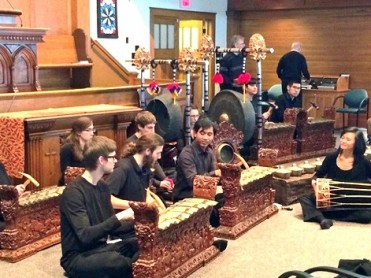A Gamelan in Mennonite Country
A Gamelan in Mennonite Country:
The Grebel College Gamelan Semara Dana, Canada’s Newest Indonesian Music Ensemble
by Andrew Timar, April 27, 2014
(The WholeNote article http://website.thewholenote.com published on March 28, 2014 included parts which have been excerpted here. – author)
The discovery of new music has always been a potent force for me, especially when that music has unfamiliar or even challenging features coupled with deep human expression that touch me in an emotional place that only music can reach. When I first heard it on LP recordings in the late 1960s the music of the Balinese and Javanese gamelan possessed both those contrasting qualities, in roughly equal parts. Perhaps it was the tension in that diametric opposition which intrigued and compelled me enough to want to know more about it.
Of course my primary sonic experience of those beautiful-sounding yet enigmatic orchestras was mediated via flat black vinyl discs reproduced electro-mechanically. The visuals were even more amorphous: musicians playing their gongs, metallophones, xylophones, flutes, fiddles and drums, and singing, could only vaguely be discerned in the record jacket photos. But eventually, perhaps inevitably, I was hooked. I wanted to know much more. More about the vocals, the organisation of the music, the people making it, their language, why the music was performed and where, what food and drink they consumed, etc. And my curiosity and wonder about the musicians and culture I found has compelled me to study and play the music for three decades and to visit Indonesia five times in14 years.
The music of the gamelan – more accurately the term covers a few dozen different kinds of instrumental ensembles, often with vocals, indigenous to several regions of Indonesia – was formally introduced to Toronto, Canada in 1983. Jon Siddall, the Dundas Ontario-born composer, was the first Canadian who not only independently purchased a complete gamelan degung set from Indonesia but also had the daring notion to hire seven other young professional musicians to play it. He also decided from the outset, inspired by his teacher the important American composer Lou Harrison (1917-2003), that new music, preferably by Canadians, must be composed for it. He called the group Evergreen Club Gamelan and it’s still commissioning works, giving concerts, and releasing albums today over 30 years later. I was fortunate to be asked to join ECG at the outset – see my article in an earlier issue of TWAS – and have been following the introduction and development of gamelan music across the country ever since.
Photo: Grebel Gamelan, cond. Maise Sum (drum), performs Feb. 2, 2014 in the service of the Rockway Mennonite Church; from Rockway News issue #22, 2014, Kitchener, ON.
I was therefore very pleased to read that Conrad Grebel University College at the University of Waterloo established a Balinese gamelan and a studio course in the 2013 fall term. Dr. Maisie Sum, the newly appointed faculty member in Global Music and the university’s first ethnomusicologist, teaches the course titled “World Music Ensemble: Gamelan Music of Bali,” casually known as the Grebel Gamelan. Moreover Sum’s incoming mandate according to the university website includes the expansion of “the study and performance of ‘world music’ in the music program.” Music students can expect to be introduced “to unfamiliar sounds, to [discover] global music by actively participating as listeners and music makers, and to encourage them to ask questions and make connections with their own beliefs, values, and practices.” Will such wide-ranging – idealistic even – goals articulated in this mission statement attract students, regional community engagement and listener participation?
Seeking background on the story of the arrival of Western Ontario’s first gamelan I spoke to Sum at her office on the cold and rainy afternoon of March 19, 2014. It turns out she is a product of the Canadian gamelan scene: “I’m a member of a Balinese gamelan in Montreal and received my PhD in ethnomusicology from the University of British Columbia.” In Vancouver she studied a kind of Balinese gamelan called semara dana with Michael Tenzer followed by years of music field work in Bali. “Conrad Grebel’s gamelan semara dana, a kind of seven-tone Balinese instrumental ensemble, is currently rented from its New York owners,” she noted, “but the university is exploring the purchase of its own set for the long term.” There’s also the ever-pressing matter of where to permanently house a full gamelan which takes up considerable real estate, an issue that’s been problematic for many institutions. Sum seems confident, however, that solutions will be found given the very positive, enthusiastic reception of the Grebel Gamelan course and its performances by faculty, students and audiences: “Enrolment for the ensemble doubled in the winter term, so we currently have two groups.”
What does having the first resident gamelan at Grebel/UW mean for music discovery in the Kitchener-Waterloo region? “It is important to us in many ways, some of which include broadening our students’ musical and cultural awareness, and expressing our core values such as community building, creativity, and global engagement,” Sum replied. While the new ensemble is not yet playing all the various types of instruments of the gamelan semaradana the Conrad Grebel Gamelan Ensemble video clip from its November 27, 2013 noon-hour concert exudes confidence. Enthusiastic smiles abound and a standing ovation greets the musicians. The clip is on YouTube awaiting your discovery. The group demonstrates a performance level belieing less than three months’ prep time between introducing the students to the instruments to the gig itself. This speaks volumes about their dedication but also about the embedded quality and power of the community musical tradition they passionately convey. It also speaks highly of the teaching skills of Sum and her expert Balinese guest musician, I Dewa Made Suparta.
Sum provided another demonstration of music discovery, one which extends to transcultural community interaction. On February 2 this year her Grebel Gamelan was invited to take part in a church service at the Rockway Mennonite Church in Kitchener. The members of the congregation heard Grebel/UW music theorist Carol Ann Weaver deliver a cross-cultural sermon titled “Gamelan as Gospel: Creating Communities of Peace.” In it, she explored parallels between communal musicking embedded in indigenous performance of Balinese gamelan and Mennonite notions of community.
That the Grebel Gamelan, consisting of a community of musicians playing music on an set of instruments indigenous to a small island around the world, was eagerly embraced by the congregation is a good measure of the status of Canadian tolerance and willingness to accept “other” notions of music making, community, and the sacred. Such active acceptance, in my opinion, is a necessary prerequisite to define the practice and spread of world music making in Canada today, and to ensure the health of its future practitioners and audiences.
Photo: Carol Ann Weaver (right) guides children in a gamelan demonstration during a worship service, Feb 2, 2014; from Rockway News issue #22, 2014, Kitchener



